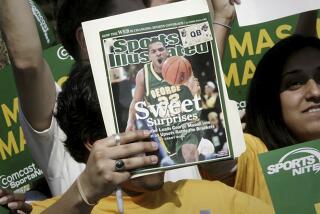‘Newspapers Going for a New Look’
- Share via
David Shaw’s article (March 13), “Newspapers Going for a New Look,” is fine as far as it went. Unfortunately, he stopped short of analyzing what the real underlying problem is--trivialization of the news. And the resulting weakening of our entire societal structure.
There is nothing wrong with flashy design, splashy graphics, and colorful pages. But what they mask is a de-emphasis on content.
In the attempt to compete with television, USA Today and the National Enquirer, the traditional press is being forced to grapple at the level of the “lowest common denominator.” Give the public what it wants--condensations, trivialization, superficiality.
The dilemma is that when news consumers are given the choice of news channels, they will choose the “fast-food” diet of flashy headlines, radio summaries, and colorful pictures (just as a food consumer will choose french fries and hot fudge sundaes over broccoli and bran flakes). We want to enjoy what is fun, fast, and tasty rather than what is good for us in the long run.
The scary scenario is that a public that feeds itself on such a diet of “fast-food” news is being intellectually malnourished.
In a free society where the people elect a representative government and vote directly on ballot propositions, we need more than ever an electorate that can make intelligent decisions on nuclear policies, economic issues, environmental protection, genetic engineering, and an expanding number of other perplexing social issues. It is not an easy task.
And yet increasingly we shirk such responsibilities. We turn instead to People magazine, “Good Morning America” on TV and skimpy tabloids in a subconscious attempt to avoid confronting the complex issues that must be resolved.
Only 60% of the public bothers to vote. And those citizens who do go to the polls vote for images and charisma, glib slogans and easy answers, promises and panaceas. We choose our leaders the same way we choose our soap and canned hams--through full-page ads and 30-second commercials.
The price of freedom is eternal vigilance--and an informed citizenry. Can the commercial Fourth Estate carry out its role in such a free society when it has to rely on graphics designers who call for snappy headlines, briefer stories, and colorful charts?
And can a society that relies on headline news and comic-book culture responsibly govern itself?
DONALD N. WOOD
Professor of Mass Communication
California State University
Northridge


